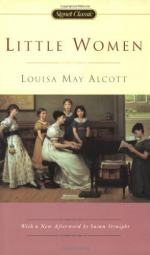“Poor little man, he’s worn out with sleep and crying. I’ll cover him up, and then go and set Meg’s heart at rest,” thought John, creeping to the bedside, hoping to find his rebellious heir asleep.
But he wasn’t, for the moment his father peeped at him, Demi’s eyes opened, his little chin began to quiver, and he put up his arms, saying with a penitent hiccough, “Me’s dood, now.”
Sitting on the stairs outside Meg wondered at the long silence which followed the uproar, and after imagining all sorts of impossible accidents, she slipped into the room to set her fears at rest. Demi lay fast asleep, not in his usual spreadeagle attitude, but in a subdued bunch, cuddled close in the circle of his father’s arm and holding his father’s finger, as if he felt that justice was tempered with mercy, and had gone to sleep a sadder and wiser baby. So held, John had waited with a womanly patience till the little hand relaxed its hold, and while waiting had fallen asleep, more tired by that tussle with his son than with his whole day’s work.
As Meg stood watching the two faces on the pillow, she smiled to herself, and then slipped away again, saying in a satisfied tone, “I never need fear that John will be too harsh with my babies. He does know how to manage them, and will be a great help, for Demi is getting too much for me.”
When John came down at last, expecting to find a pensive or reproachful wife, he was agreeably surprised to find Meg placidly trimming a bonnet, and to be greeted with the request to read something about the election, if he was not too tired. John saw in a minute that a revolution of some kind was going on, but wisely asked no questions, knowing that Meg was such a transparent little person, she couldn’t keep a secret to save her life, and therefore the clue would soon appear. He read a long debate with the most amiable readiness and then explained it in his most lucid manner, while Meg tried to look deeply interested, to ask intelligent questions, and keep her thoughts from wandering from the state of the nation to the state of her bonnet. In her secret soul, however, she decided that politics were as bad as mathematics, and that the mission of politicians seemed to be calling each other names, but she kept these feminine ideas to herself, and when John paused, shook her head and said with what she thought diplomatic ambiguity, “Well, I really don’t see what we are coming to.”
John laughed, and watched her for a minute, as she poised a pretty little preparation of lace and flowers on her hand, and regarded it with the genuine interest which his harangue had failed to waken.
“She is trying to like politics for my sake, so I’ll try and like millinery for hers, that’s only fair,” thought John the Just, adding aloud, “That’s very pretty. Is it what you call a breakfast cap?”
“My dear man, it’s a bonnet! My very best go-to-concert-and-theater bonnet.”




